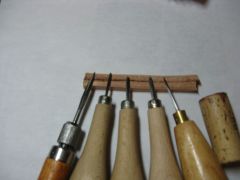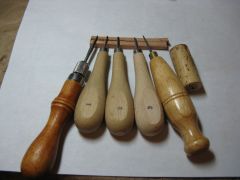-
Posts
1,935 -
Joined
-
Last visited
Content Type
Profiles
Forums
Events
Blogs
Gallery
Store
Everything posted by billybopp
-
I paint a lot of letters for the mug wraps that I make. It's not all that hard to do, but does take some practice and a moderately steady hand (don't be well caffeinated when doing fine paintwork). You can use leather dyes or acrylic paint. Limit the amount of paint or dye on your brush by wiping it on a piece of paper or better a piece of scrap leather. This will help to avoid dyes spreading too much to areas where you don't want it, and in the case of paint keeps the coat relatively thin with less spillover to where you don't want paint. Paint will give you more vibrant colors than dyes will, and in the case of white and gray the dyes are about useless. Some paint colors will look better if you first put on a ground coat of white paint, others not so much. I like to use a #3 filbert style brush for 3/4" letters, with a #00 round brush for those really tight corners. Leather acrylics work best. I've used Tandy Cova Color, but others swear by Angelus paint. I have also used Liquitex art acrylics, but they are a bit trickier. For my stuff, after I've painted and allowed stuff to dry well, I then paint a couple of layers of dye resist on the paintwork, and allow that to thoroughly dry. Over all dye is applied at this point if desired, trying to avoid painted areas as much as possible. Then a coat of finish such as resolene or leather sheen over the entire piece and allow that to dry. Then, an antique paste is worked in well so that it settles down into the impressions in the letters, etc. Excess antique is removed, and allowed to dry, then a couple of coats of finish. As an aside, another interesting option for letters and other impressions is gilding. It's not easy, but the result can be really cool! Here are a few pieces that I've made recently. This one has silver gilded letters and tree, with green dye amongst the celtic knots top and bottom, and acrylic paint on the beard pullers. In this case, I didn't protect the gilding well enough and some rubbed off when I applied the antique, but I decided that I like the worn look and kept it! Hope that helps! Bill
-

A Couple More Exotic Leather Arm Guards
billybopp replied to dhaverstick's topic in Collars, Cuffs, Leashes and Leads
Really nice work! And certainly nicer than the piece of cardboard that I taped to my arm when Mom wouldn't pay $10.00 for a proper arm-guard when I was a kid! Bill- 7 replies
-
- ostrich
- exotic leather
-
(and 1 more)
Tagged with:
-

Questions About Cutting Dies
billybopp replied to barehandcustoms's topic in Leatherwork Conversation
T-bones on the grill?? I'll be right over! -

Adler Class Iii - Early 1900 Leather Sewing Machine
billybopp replied to Constabulary's topic in Leather Sewing Machines
Thanks for posting both videos! I love seeing "pure" mechanical things at work, so I'm a big fan of steam engines, big round aircraft engines and such, particularly when they have style and grace that modern machinery lacks. I have a 1940's or 1950's vintage Singer 221- that belonged to my mom and grandmother. It's a tiny little machine, but it still works and I still use it from time to time despite having a recent machine. There's just something cool about that old machine. I'm still willing to bet the Campbell legal department makes them include a legal disclaimer sheet the size of a book .. And after watching the video I'm wiling to bet that one of the items in it is "Hearing protection MUST be worn". LOL Bill -

Surface Cracks
billybopp replied to JLSleather's topic in Gun Holsters, Rifle Slings and Knife Sheathes
LOL. Croc or gator, it looks great either way. Bill -

Adler Class Iii - Early 1900 Leather Sewing Machine
billybopp replied to Constabulary's topic in Leather Sewing Machines
It's always amazing to see how sturdy-made and beautifully decorated some of these old machines are. And also how dangersous! LOL. Can you imagine any manufacturer today building a machine with so many exposed moving parts? Somebody would find a way to put a hand where it didn't belong and sue within a week of the first machine being installed. I guess the world changes. Bill -
I use line 20 on 3-4 oz veg tan all the time for the mug wraps that I make. They are not really stressed in that application, tho. And they are considerably "tighter" than glove snaps. I think that if I were to use them on something that takes more stress, I'd back the area with a leather washer to help protect the project from the sharpish edges on the snap. Hope that helps Bill
-

Finished My First Purse
billybopp replied to Dan28's topic in Purses, Wallets, Belts and Miscellaneous Pocket Items
Really nice! -

Surface Cracks
billybopp replied to JLSleather's topic in Gun Holsters, Rifle Slings and Knife Sheathes
It's all wrinkly! Almost like it's made of aligator or somethin'. -
Awl blades very in width, length, and profile, and can affect stitching. Awl handle sizes can vary significantly, which is mostly important for how it fits your hand. Awl blade length, width and profile also vary greatly. The left is a Tandy 4 in 1, the right a Tandy 1 1/4" awl, and the middle three are three sizes of Seiwa awl. You can clearly see that the left awl .. sometimes referred to a saddler's awl or a wing awl has a significant taper to the blade and will make a larger hole on the entry side of the leather than on the exit side. It also requires precise depth control to maintain the same hole size on the entry side. The right awl is also tapered, but not nearly so much as the first. The middle three are straight sided and will make the same size hole through both sides of the leather, and are the ones I prefer to use. Also of note, the Seiwa awls arrived in a nearly usable state and required very little work to make very sharp. The other two required quite a lot of work to make usable. Hope that helps Bill
-
From the album: Billybopps Stuff
Varying awl sizes and profiles with double thickness 10oz leather. -
From the album: Billybopps Stuff
Varying sizes of awl handles -
http://springfieldleather.com/40707/Calfskin%2CTooling%2CNatural%2C2-3oz/
-
I believe the Springfield leather will sell in small amounts. Check their website.
-
She will love it.
-
LOL. There are 1001 file extensions out there(and then a bunch more for good measure). And even us pros don't know what ALL of them are. If you don't know, don't delete it! Bill
-

Slim Tote
billybopp replied to MonicaJacobson's topic in Purses, Wallets, Belts and Miscellaneous Pocket Items
It looks like skiving did the trick on the corners. The edges don't look bad either. If you wanted to finish them a little more thoroughly, you could experiment with edge coats. Fiebings makes a clear edge coat to which you can add dyes to get just the color that you want. Others have added dye to Tan Kote, I believe with good results. Those may be worth a try, although I have not tried them. I'd certainly experiment on a scrap piece first, tho. Bill -

Chubby Roses
billybopp replied to JLSleather's topic in Purses, Wallets, Belts and Miscellaneous Pocket Items
Very nice indeed! -

Slim Tote
billybopp replied to MonicaJacobson's topic in Purses, Wallets, Belts and Miscellaneous Pocket Items
It looks quite nice! For the top corners you might skive the strip and front/side down in the corners so that they are closer to thickness of a single piece combined. Bound edges would look nice too, but that would drastically change the look of the bag. Bill -
Thanks to All.
- 7 replies
-
- guitar strap
- deer
-
(and 1 more)
Tagged with:
-
I like the peg idea, Red Cent. Up 'til now, for me, the spousal unit's hands have served the same purpose as those when cutting thinner leather. I bet your idea is much cheaper in the end, and just as effective. Bill
-
Thanks! LOL ... There were certainly some brick walls hit on this project. Pictures don't really show the depth of the color on the rainbow, but what a time getting it on there. The acrylic that I used goes on very transparent, so there had to be a white ground beneath, and then two to four airbrushed color coats for each color. But it has the kind of depth that you see in a really nice car finish! Bill
- 7 replies
-
- guitar strap
- deer
-
(and 1 more)
Tagged with:
-
Thanks. Lots was learned on this project. And lots will never be attempted again. LOL
- 7 replies
-
- guitar strap
- deer
-
(and 1 more)
Tagged with:
-
Here are some leather mug wraps that I've recently made. Edges are done with an embossing roll, and then dyed / painted using artist brushes. The center, personalized parts are a combination of stamps and tooling with dying / coloring brushed on and usually some antique paste. Various types of dyes are used for the larger areas. Finish is usually saddle-sheen or resolene, front and back. The celtic beard pullers on Tom's wrap are a traditional celtic form that he really likes, and the lettering and tree are a silver gilding. I have to give props to BDAZ for his laser printer transfer technique for the beard pullers. I could not have managed the detail there any other way. Bill
-
Here are a few shots of a recently completed guitar strap for a friend of mine. You probably can't guess what band he likes. It's about 4 oz veg tan with a deer lining, and a pick holder on back. I bought the deer hide on sale, and it was just crap when it arrived. The grain side was terribly wrinkly and looked like it had been dragged through a coal mine. I kept it anyway and ended up using the flesh side for this and other projects! Props for the deer idea to Colt Knight. This feels like buttah against skin!
- 7 replies
-
- guitar strap
- deer
-
(and 1 more)
Tagged with:




